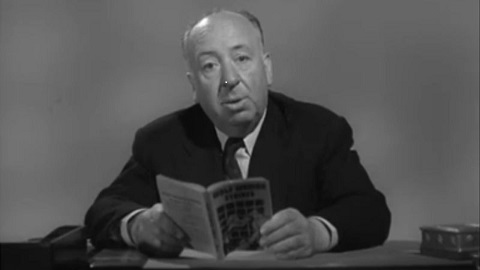
The 60s Official Site
"Where Music is Our Middle Name"
Quick Links
Your Daily Oldies Fix Top Ten Countdown Solid Gold Memories Jukebox Music
Vibration of a Nation Remember When Television of the 50s and 60s 60s Slang
Things You Just Don't Hear Anymore 60s TV Commercials Chickenman Episodes Woodstock This Weeks Number One Hits
The Early Years of Rock and Roll Vietnam War Myths
All the content menu is listed on the left menu border bar
Alfred Hitchcock Presents
Alfred Hitchcock Presents is an American television anthology series that was created, hosted, and produced by Alfred Hitchcock; the program aired on CBS and NBC between 1955 and 1965. It featured dramas, thrillers, and mysteries. Between 1962 and 1965 it was renamed The Alfred Hitchcock Hour. By the time the show premiered on October 2, 1955, Hitchcock had been directing films for over three decades. Time magazine named Alfred Hitchcock Presents as one of "The 100 Best TV Shows of All Time"
Hitchcock appears again after the title sequence and drolly introduces the story from an empty studio or from the set of the current episode; his monologues were written by James B. Allardice. At least two versions of the opening were shot for every episode. A version intended for the American audience would often spoof a recent popular commercial or poke fun at the sponsor, leading into the commercial. An alternative version for European audiences would include jokes at the expense of Americans in general. For later seasons, opening remarks were also filmed with Hitchcock speaking in French and German for the show's international presentations Hitchcock closed the show in much the same way as it opened, but mainly to tie up loose ends rather than joke. Frequently, a leading character in the story would have seemingly gotten away with a criminal activity; in the postscript, Hitchcock would briefly detail how fate (or the authorities) eventually brought the character to justice. Hitchcock told TV Guide that his reassurances that the criminal had been apprehended were "a necessary gesture to morality." |
|





